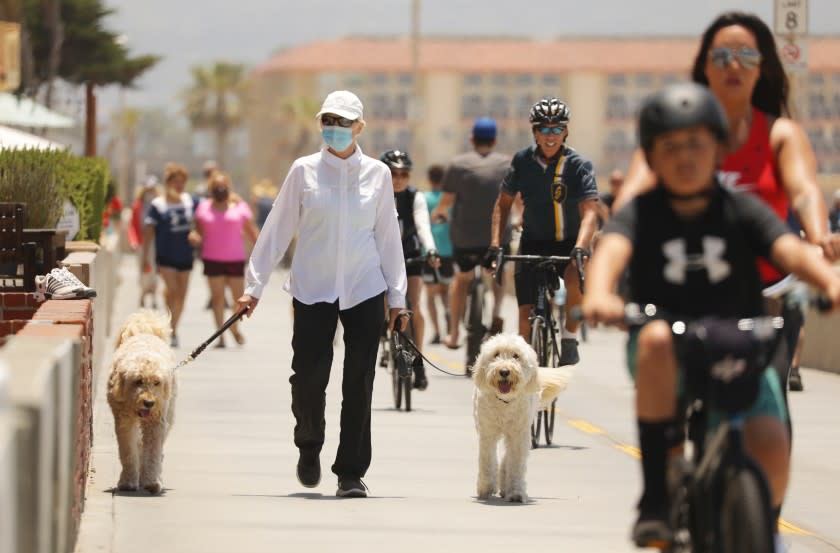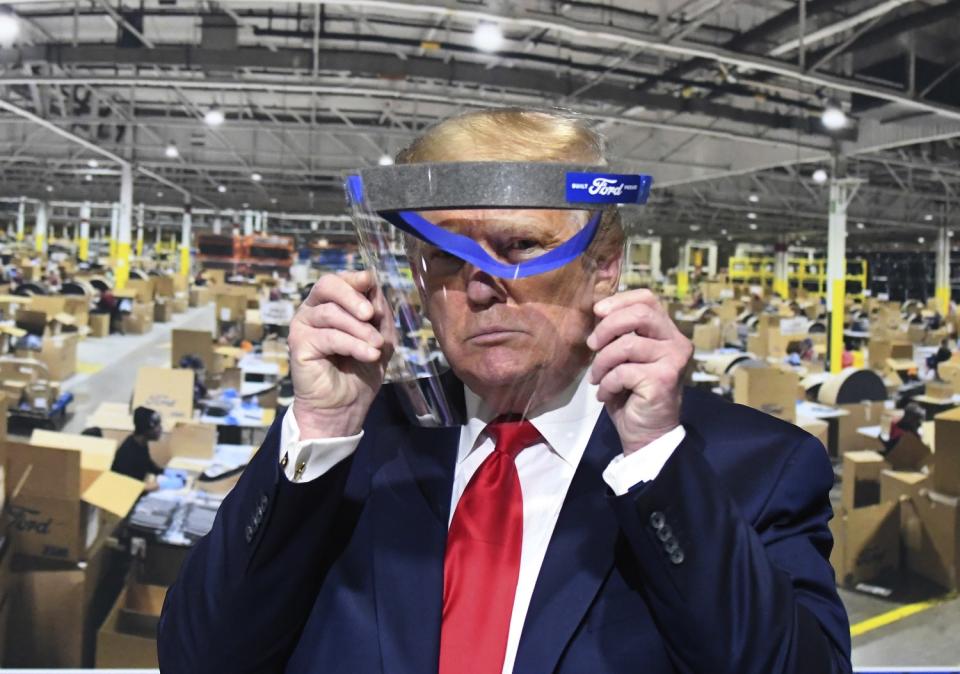As deaths near 100,000, Trump and others head outdoors, often without precautions

Preparing to celebrate Memorial Day, Americans flocked to beaches and parks Sunday, with many ignoring disease precautions even as the nation's coronavirus-related deaths approached the bleak milepost of 100,000.
As public health experts made a fresh round of appeals for physical distancing and face coverings, President Trump visited his Virginia golf property for a second straight day. He delivered an upbeat message while heading for the links, despite both the death count and predictions that double-digit U.S. unemployment would drag on into the early winter — past the November election — possibly coinciding with a second wave of infections.
“Cases, numbers and deaths are going down all over the Country!” Trump tweeted from the motorcade en route to his club.
Although the outbreak has eased in many areas, dangerous hot spots remain, including Greater Los Angeles, Chicago and Washington, D.C., with spikes in some less populated places as well.
“This isn't contained, and it's still continuing to spread,” former Food and Drug Administration Commissioner Scott Gottlieb said Sunday on CBS’ “Face the Nation.” He cited rising hospitalizations in “many states: Florida, Georgia, Virginia, Maryland, Minnesota, Wisconsin, Ohio, Arizona.”
After weeks of restrictions meant to fight the spread of COVID-19, the disease caused by the coronavirus, every state is in some stage of reopening. Many, though, have failed to meet U.S. Centers for Disease Control and Prevention guidelines for a safe return to public life.
One of the country’s leading virus experts, Dr. Deborah Birx, the director of Trump's coronavirus task force, warns that even in the open air, physical distancing and face coverings, when in proximity to others, are essential.
“Out of respect for each other, as Americans that care for each other, we need to be wearing masks in public when we cannot social-distance,” Birx said on “Fox News Sunday.”
That message was echoed in sharper terms by Tom Bossert, Trump's former White House homeland security advisor, who has at times been critical of the administration’s pandemic response.
“Wear a mask — it’s common decency,” he said, citing the theme of respect and remembrance that underpins Memorial Day. “Pray and think about those that passed in our former wars … but also about those that passed in the last three months.”
His former boss, however, was characteristically mask-free Saturday and Sunday as he came and went from the White House and his club.
With the three-day holiday weekend in full swing, news reports and social media featured many images of people clustering tightly at waterfronts, in swimming pools and in alfresco bars and restaurants without wearing masks. However, despite Trump's insistence Friday that states allow places of worship to reopen, Americans did not seem to be filling pews Sunday; even conservative congregations were largely closed, offering prayer fellowship online or in parking lots.
Tens of thousands more Americans have died in the pandemic than in Vietnam and all of the country’s conflicts since, combined. On Sunday, the New York Times memorialized the dead with a striking gesture, devoting the entire front page and several inside ones to listing 1,000 names — just 1% of the total deceased — with short but vivid snippets of their lives culled from obituaries.
“Incalculable loss,” the headline read.
Birx, who is often at pains to avoid disagreements with Trump, was asked in the Fox interview about the president’s refusal to wear a face covering in public. Trump told reporters that he had worn a mask for part of a factory tour in Michigan last week but that he did not want to give journalists the “pleasure” of seeing him in it.

“I’m not with him every day and every moment, so I don't know if he can maintain social distance,” Birx said. “I've asked everybody independently to really make sure that you're wearing a mask if you can't maintain the six feet. I'm assuming that in a majority of cases he's able to maintain that six-feet distance.”
Bossert was more acerbic, telling ABC News in response to a question about Trump and masks: “‘Do as I say, not as I do’ isn’t very useful.”
At a White House briefing last week, before Trump’s weekend golf outings, Birx said she well understood the public's need for outdoor recreation, especially over a long holiday weekend. "You can go out. You can be outside. You can play golf. You can play tennis with marked balls. You can go to the beaches if you stay six feet apart,” she said then.
Although many people are flouting distancing and masking recommendations while outdoors, Birx told ABC, “I think that’s our job to continue to communicate.”
Though overall White House messaging, and certainly Trump's, has focused on a robust economic recovery beginning soon, a senior Trump advisor said Sunday that joblessness would continue to rise this month and next, after reaching nearly 40 million claims last week.
“The unemployment rate will be higher in June than in May, but then after that, it should start to trend down,” economic advisor Kevin Hassett said on CNN’s “State of the Union.”
Asked whether he thought the jobless rate would still be in the double digits in November, when the election is held, Hassett said: “Yes, I do.” But he also predicted that signs of a larger economic recovery would be “raging everywhere” by then.
The Trump administration has weathered widespread criticism for its handling of the pandemic, but the president has often called restrictions he imposed on travel from China — and later Europe — as policy triumphs. On Sunday, the White House announced that Trump was suspending U.S. entry by foreign nationals who had been in hard-hit Brazil in the preceding 14 days.
Public health experts have predicted that, by late fall, the United States could be in the grip of a heavy second wave of infections, but Trump said last week that the country, and the economy, would stay open in any event. Birx, asked about the likelihood of new lockdowns, said “it’s difficult to tell” what measures might be taken if the outbreak took on a new ferocity.
Gottlieb, in his CBS interview, said Americans should not be lulled into complacency if infections and deaths eased somewhat in the summer season.
“We're likely to have this slow burn through the summer, and then face renewed risk in the fall that we're going to have bigger outbreaks and potentially epidemics in certain states and cities,” he said. “That's what we need to be focused on right now, getting the tools in place to prevent that in the fall.”

